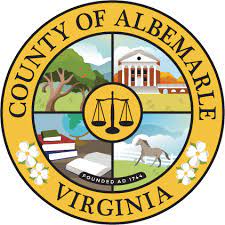Meetings of the Thomas Jefferson Planning District Commission always end with a roundtable discussion of what is happening in the six localities that make up the regional body. On February 10, 2022, there were lots of reports about housing initiatives across the area.
The TJPDC will work with a nonprofit partner to help prevent evictions through a pilot program with funding from the Virginia Department of Housing and Community Development. (DHCD)
“It’s $250,000 for Charlottesville and Albemarle County,” said executive director Christine Jacobs. “That grant actually will have a subrecipient and that will be Piedmont Housing Alliance and that will allow them to hire an eviction prevention case manager as well as a landlord outreach manager which was what we requested in the grant application.”
Last year, the city of Charlottesville used $300,000 from American Rescue Plan Act funding to pay Legal Aid Justice Center to also work in the area of eviction prevention. Jacobs said the TJPDC used that funding as a local match to secure the DHCD grant.
The TJPDC is also administering a $2 million grant from Virginia Housing to actually construct units. Jacobs said requests for proposals have been received and there three entities have been selected to proceed.
“We will then have those three priority applicants submit their formal applications with all of their documentation and then a review panel will look at the feasibility of the project,” Jacobs said.
Jacobs said the TJPDC Commissioners will be shown a recommendation at their meeting in April.
Last year, the TJPDC completed a regional housing plan which has chapters for each of the six jurisdictions. Keith Smith represents Fluvanna County on the TJPDC Board. (plan website)
“We’re starting our comp plan process and it looks like we’re going to be leaning pretty heavily on the work that the Regional Housing Partnership has done,” Smith said.

Greene County Supervisor Dale Herring said his locality continues its separation from the Rapidan Service Authority. That entity did not want to proceed with Greene’s vision to create a new reservoir for an urban water supply.
“For those who don’t know, we’ll stay with it until we actually own our own water authority,” Herring said.
Greene County has recently created its own emergency medical services department and has offered to pay for full time firefighters. However, there may be an issue.
“We had one fire department that has asked originally for four staff members,” Herring said. “They came back and asked for seven.”
Herring said the county continues to hope to supplement fire service with volunteers, but numbers are dwindling.
The TJPDC meetings are also an opportunity for urban communities to brief rural ones on trends that may affect them in the future. City Councilor Michael Payne shared information about the fundamentals informing the creation of the budget for next fiscal year.
“We got our assessment increases and the average assessments were up eleven percent,” Payne said. “We’re beginning budget discussions and to afford everything currently in our budget, on top of that 11 percent increase will require a ten cent real estate tax increase.”
The major driver is the renovations to Buford Middle School as a major plank in school reconfiguration, as well as an $10 million commitment to affordable housing projects.
“So we are going to have to have some difficult, honest, and realistic conversations over the coming weeks about how to get our budget working,” Payne said.
Another difficult conversation will be had when the public process related to the upgrade of the zoning code begins later this year. Planning Commission Chair Lyle-Solla Yates is a new member of the TJPDC and he said Rhodeside & Harwell and internal city staff are working on a review.
“They’re doing an analysis of what we’ve got versus what our Comprehensive Plan says we need,” Solla-Yates said. “It’s going to be a big project and it’s going to be difficult. We should have something I’m recalling, an initial assessment in mid-April and once we have that we will go into public process and people will share their thoughts and feelings on zoning which is always a good thing.”
Nelson County faces a lot of changes and challenges, according to Jesse Rutherford. He’s chair of both the Nelson Board of Supervisors as well as the TJPDC. A Comprehensive Plan review is soon to get underway.
“And trying to figure out it is we can thrive as a community, which leads into the bigger thing which is even more important than the Comprehensive Plan – zoning,” Rutherford said. “How do you define things in rezoning? I think affordable housing has to be radically looked at and radically approached as opposed to pandered by the respective demographics in power. At the end of the day its about making sure that everybody and every income bracket has a place to live.”
Rutherford said Nelson has many more people who are opting to work from home, and the county’s pledge for universal broadband by 2024 could accelerate a trend.
“And we’re starting to see a change in the conversation of what does the future of a rural county look like,” Rutherford said. “Obviously preserving rural is such an interesting thing. Is it preserving trees? Is it water? For some people it’s culture.”
That housing plan also has information for Nelson County. The TJPDC next meets on March 3.

Before you go: The time to write and research of this article is covered by paid subscribers to Charlottesville Community Engagement. In fact, this particular installment comes from the February 17, 2022 edition of the program. To ensure this research can be sustained, please consider becoming a paid subscriber or contributing monthly through Patreon.












